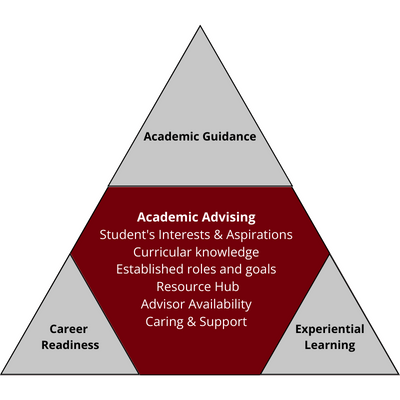
Strategic Priority #1, "Reimagining the Student Experience and Advancing Post-Graduate Success”
The University Advising Center supports undergraduate student success through a wide variety of programs and offices including: the Office of Exploratory Advising and Academic Coaching, Curriculum Management and faculty support, Transfer Advising and Retention, Advisor Training and Certification, Student Success Technology, and four-year comprehensive Academic Advising.
Strengthen student support services and infrastructure including academic and career advising and student wellness to reduce barriers to retention and graduation.
Example UAC Programs/Initiatives in Support of this University Initiative:
- Comprehensive, four-year academic advising
- Academic interventions aimed at student retention and supporting at-risk students
Enhance post-graduate outcomes by developing intentional experiences beyond the classroom that prepare students for all aspects of their future lives.
Example UAC Programs/Initiatives in Support of this University Initiative:
- Promotion of student resources for using My USC Experience
- Resources and tools for advisors to support student conversations around My USC Experience
Enhance student access, affordability, and sense of belonging for all students including low-income, first-generation, international, and underrepresented students.
UAC Programs/Initiatives in Support of this University Initiative:
- Intentional Transfer Student support through early transfer advisement initiatives for incoming students, and management and implementation of direct transfer tracks between USC and SC Technical Schools
In September 2022, the University of South Carolina convened an in-person student retreat, Imagine Carolina, for approximately 200 undergraduates to hear directly from students about their experiences at the institution. Academic Advising was identified as a top priority for students. Learn more about student feedback on academic advising in the Imagine Carolina Huron Report.
In January of 2023, President Amiridis issued a campus-wide memo stating future plans for improving Academic Advising at USC. In this memo, President Amiridis stated, "Over the next two years, the Office of the Provost will transition undergraduate academic advising to a four-year, comprehensive advising model. The UAC will partner with colleges to begin the transition this summer and continue implementation in stages to ensure all students receive an excellent and equitable advising experience. We will hire additional full-time professional academic advisors, support advisor training and development, and implement technology to support advising."
The University's transition to a four-year, comprehensive advising model has also been featured in the Post and Courier Columbia.
College Scorecard on Academic Advising
To see the progress each academic college/school is making toward a four-year advising model, view the college scorecard on Academic Advising.
To view the college scorecard, please log-in using your USC username and password.
Commonly Asked Questions
The UAC defines holistic academic advising as providing individual student support to approximately 300 assigned students. Holistic advising includes: assist new students in their transition to college, academic planning and progression, engagement on campus, career readiness, and other opportunities central to college student success.
First and foremost – the success of the UAC Advising model is dependent on the Advisors! The UAC has a team of ~70 professional staff academic advisors who prioritize student success every day. Academic Advisors have typically have Master's degrees and/or areas of specialty within the curricula they advise, go through on-going training and professional develop, and utilize student success technology. Staff within the University Advising Center have been recognized for their award winning programs and service as well as their contributions to the national academic advising landscape.
The UAC Advising Model involves constant collaboration and communication with the 11 colleges/schools where academic advisors' direct supervision and curricular training is provided by the college/school.
Eight years after implementing the University Advising Center, USC has seen significant improvements in the undergraduate academic advising experience. Learn more about these improvements in the UAC Impact Report [pdf], UAC Infographic [pdf], or by viewing the UAC Impact and Assessment section of this site.
The scorecard above is intended to provide updates regarding the status of four-year academic advising for undergraduate students at USC-Columbia. This website will be updated frequently.